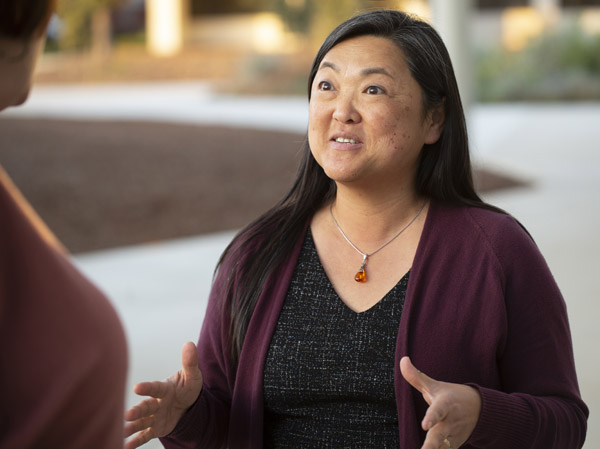Researcher Katherine Kim leverages data to tailor health care delivery
After 25 years in health care services administration and private industry health-related technology product management, Katherine Kim became convinced that her contribution to health care was not as great as it could be.

Assistant Professor Katherine Kim merges data and technology to advance health.
“I wanted to solve problems in health care, and I realized that I needed to become a researcher to do that,” Kim said. Since becoming an assistant professor at the Betty Irene Moore School of Nursing in 2014, Kim distinguished herself as a prolific research team leader in numerous funded projects investigating use of information technology to advance clinical research and improve public health.
Kim, who has a joint academic appointment as an assistant professor in the School of Medicine’s Department of Public Health, Division of Health Informatics, was the first graduate of the Nursing Science and Health-Care Leadership doctoral program at UC Davis. That was the only doctoral program to which she had applied.
“The nursing informatics perspective has the most holistic view of the patient and is much broader than clinical informatics, so I realized I needed to be in a nursing school program,” Kim said. “I applied only to the Betty Irene Moore School of Nursing because of two of its core principles — to conduct transformative research to reshape the health system and to use innovative technology to accomplish such change.”
As a product strategy director in the software industry in the early 2000s, Kim conceived products that consumers or clinicians might need, and described those concepts to guide programmers and engineers in developing software and hardware. Now as an academic researcher, Kim conducts numerous studies, including investigation of ways to integrate data from personal fitness trackers, smart watches and other wearable health-sensor devices into clinical electronic health records. That study is one component of her research focusing on precision medicine.
“Merging person-generated health data from wearable devices with clinical data from lab tests and diagnostic procedures could yield a more comprehensive, holistic picture of the health of individuals as well as factors that influence their health,” Kim said. Such complementary sets of data could help personally tailor interventions to individuals. She believes that health informatics knowledge is vitally important in nursing education. “In every realm of practice — in patient care, in quality improvement programs, in patient safety programs — nurses deal with technology and data,” Kim said. “For every nurse coming through the program, and at the master’s-degree and doctoral levels, understanding of informatics is critically important.”
Katherine Kim helps oversee UC Davis role in monumental national study
Katherine Kim, an assistant professor in the Betty Irene Moore School of Nursing, is one of two UC Davis faculty members who oversee the UC Davis arm of the National Institutes of Health’s monumental, nationwide All of Us Research Program that first enrolled participants in 2018. Kim shares project leadership duties with Alexander Borowsky, an associate professor of pathology and laboratory medicine in the School of Medicine.
UC Davis is one of five California academic health centers comprising the California Precision Medicine Consortium (CAPMC), which implements the California contingent of the All of Us Research Program. The state’s other consortium members include UC Irvine, UC San Diego, UC San Francisco, Cedars-Sinai Medical Center, the San Diego Blood Bank and the University of Southern California.
CAPMC is one of the health care provider organizations that NIH designated to enroll participants. NIH relies on these groups to collectively create a national research cohort of 1 million or more participants from whom to collect genetic, biological, environmental, health and lifestyle data. The information gathered will serve as a repository accessible to scientists nationwide, with the intention of accelerating knowledge applicable to advancements in precision, individualized health care.
“Gathering and managing electronic health record data for a precision medicine study of this magnitude requires a very sophisticated clinical and recruitment infrastructure,” Kim said. “I previously led a research network with some of the other California Precision Medicine Consortium sites that had developed that kind of infrastructure. We have the information technology in place enabling us to manage that pipeline and deliver clinical data to the NIH All of Us program.”
Participant enrollment in the program must reflect regional and national population diversity. The U.S. Congress authorized $1.455 billion over 10 years for the All of Us research study.





